Related Research Articles

Haleh Afshar, Baroness Afshar, was a British life peer in the House of Lords. She had a life-long interest in women's rights and Islamic law. She was a professor at the University of York and she wrote over a dozen scholarly books.
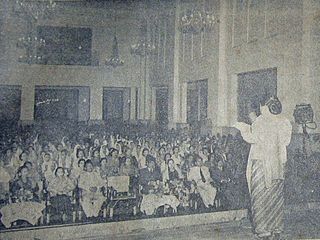
Gerwani was a women's organization founded as Gerwis in Semarang, Central Java, on 4 June 1950.
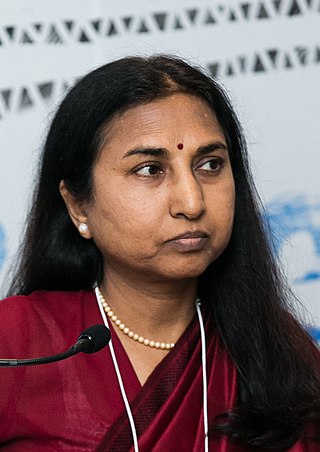
Bina Agarwal is an Indian development economist and Professor of Development Economics and Environment at the Global Development Institute at The University of Manchester. She has written extensively on land, livelihoods and property rights; environment and development; the political economy of gender; poverty and inequality; legal change; and agriculture and technological transformation.
The European Feminist Forum (EFF) was a web-based space for dialogue for feminists in Europe. Launched in April 2007, EFF served as an initiative to create dialogue and incite change in Europe. The site was available in English, Spanish, French and Russian languages. EFF was created by eight different feminist networks in Europe. EFF was non-hierarchical and invited individuals to steer the conversation on the forum. The website went offline after approximately five years of existence.
Colin Hay is Professor of Political Sciences at Sciences Po, Paris and Affiliate Professor of Political Analysis at the University of Sheffield, joint editor-in-chief of the journal Comparative European Politics. and Managing Editor of the journal New Political Economy.

Angela McRobbie is a British cultural theorist, feminist, and commentator whose work combines the study of popular culture, contemporary media practices and feminism through conceptions of a third-person reflexive gaze. She is a professor of communications at Goldsmiths College, University of London.
Isteri-Sedar was a women's organization established in Bandung, Indonesia in 1930 by Soewarni Pringgodigdo. It was a radical nationalist group founded on its anti-polygamy stance after the First Indonesian Women's Congress in 1928.
The Working Women's Front was a women's organization in Indonesia, founded in 1945. BBW emerged through the merger of various women's workers groups. S.K. Trimurti was the leader of BBW. BBW was linked to the Barisan Buruh Indonesia. When the Labour Party of Indonesia was founded, BBW became the women's wing of the party.
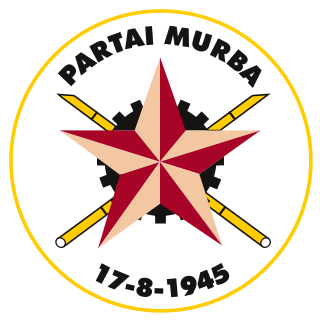
Murba Party was a 'national communist' political party in Indonesia. The party was founded by Tan Malaka, Chairul Saleh, Sukarni and Adam Malik in 1948. The history of the party was largely intertwined with that of the powerful Communist Party of Indonesia (PKI). Initially relations between PKI and the Murba Party were fluid, but gradually the two parties developed into each other's arch-enemies. The Murba Party continued to exist under the New Order, but was merged into the Indonesian Democratic Party in 1973.
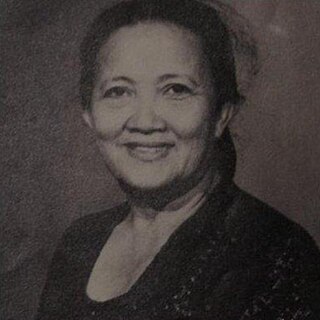
Charlotte Salawati Daud was an Indonesia politician. In 1945, she began publishing the magazine Wanita ('Woman') in Makassar, which had a circulation of 1,000.
Social citizenship was a term first coined by T. H. Marshall, who argued that the ideal citizenship experience entails access to political, civil and social rights in a state. According to Marshall, social citizenship includes “the whole range from the right to a modicum of economic welfare and security to the right to share to the full in the social heritage and to live the life of a civilized being according to the standards prevailing in society”. Marshall’s concept of social policy has been critiqued by some scholars for being idealistic and only applicable to the participation of able-bodied white males.
Raia Prokhovnik, is Reader in Politics at the Open University's Faculty of Social Sciences, for their Department of Politics and International Studies, and founding editor of the journal Contemporary Political Theory. She is the chair of the OU's interdisciplinary politics module, Living political ideas, and contributed to other modules including Power, dissent, equality: understanding contemporary politics.
James Raymond Hughes is professor of comparative politics at the London School of Economics (LSE). Hughes' research interests relate to political violence and terrorism, secession, national and ethnic conflict in the former Soviet Union, the Balkans, and Northern Ireland.
Laura Bentivoglio Davia (1689–1761) was an Italian aristocratic philosopher engaged in the pursuit of knowledge and natural philosophy. She was known primarily for creating relationships with leading natural philosophers associated with the University of Bologna and the Istituto delle Scienze.

Saskia Eleonora Wieringa is a Dutch sociologist. She is a professor of Gender and Women's Same-Sex Relations Crossculturally at the Faculty of Social and Behavioural Sciences at the University of Amsterdam. The area of study was established by the Foundation for Lesbian and Gay Studies and sponsored by Hivos. From 1 April 2005 to 19 April 2012, she served as the director of Aletta, Institute for Women's History in Amsterdam.
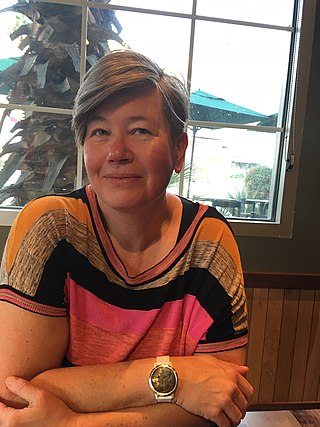
Sasha Roseneil is a group analyst and a psychoanalytic psychotherapist. Roseneil became the ninth vice chancellor of the University of Sussex in August 2022.

Sri Koesnapsijah was a Javanese language writer and activist of the Dutch East Indies and Indonesia who was among the generation of Indonesian women writers active in the 1930s. She was known for her short stories and articles which she published in the magazine Panjebar Semangat in the 1930s and 1940s, where she was also an assistant editor. After Indonesian independence she was active in the Communist Party-affiliated Gerwani movement, and was briefly a representative of the Communist Party in the Jakarta-area consultative body DPR-GR. She was arrested in late 1965 during the anti-communist repression of the Transition to the New Order and imprisoned without charge for the following decade.

Soekaesih was a Communist Party of Indonesia activist known for being one of only a handful of female political prisoners exiled by the Netherlands government to Boven-Digoel concentration camp. After being released she traveled to the Netherlands in the late 1930s and campaigned for the camp to be shut down.

The Indonesian Women's Congress, often known by its Indonesian acronym Kowani, is a federation of Indonesian women's organizations which was founded in 1946. Its headquarters are located in Jakarta. The name also refers to national congresses which have taken place regularly since 1928. Since its founding the Congress has included women from various political and religious backgrounds; it has generally allowed independence and autonomy for its member organizations.

Umi Sardjono was a prominent Indonesian activist who fought for the independence of the country and supported women's rights. She was involved in the anti-fascist and anti-war movements from the 1940s to the 1960s. As a resistance fighter during the Japanese occupation of the Dutch East Indies, she and her husband operated a food stall which served as a message center for the underground. Captured in 1944, the couple were imprisoned until the surrender of Japan. On gaining release, they worked in the independence movement hoping to free Indonesia from Dutch rule.
References
- ↑ Kahin, George McTurnan. Nationalism and Revolution in Indonesia . Studies on Southeast Asia, 35. Ithaca, NY: Cornell Southeast Asia Program, 2003. p. 314
- ↑ Himpunan Lembaran Penguasa Perang Tertinggi . [Djakarta]: Tata-Usaha Lembaran Penguasa Perang Tertinggi, 1960. p. 14
- 1 2 3 4 5 Martyn, Elizabeth. The women's movement in post-colonial Indonesia: gender and nation in a new democracy . London [u.a.]: RoutledgeCurzon, 2005. p. 219
- ↑ McCormick, Indra. Women As Political Actors in Indonesia's New Order . Victoria, Australia: Centre of Southeast Asian Studies, Monash University, 2003. p. 34
- ↑ Wieringa, Saskia. Sexual Politics in Indonesia . Houndmills, Basingstoke, Hampshire: Palgrave/Macmillan, 2002. p. 95
- ↑ Société pour l'étude et la connaissance du monde insulindien, Association Archipel, Centre national de la recherche scientifique (France), Institut national des langues et civilisations orientales, and Ecole des hautes études en sciences sociales. Archipel . [Bandung]: SECMI., 1971. p. 205
- ↑ Wieringa, Saskia. Sexual Politics in Indonesia . Houndmills, Basingstoke, Hampshire: Palgrave/Macmillan, 2002. pp. 164-1965
- ↑ Raja, Emmy St. Margaretha Lumban, and Yuniarti Nur Hanifah. Kaukus Perempuan Politik Indonesia: peluang dan tantangan . [Jakarta]: Program Studi Kajian Wanita, Program Pascasarjana, Universitas Indonesia, 2008. p. 34